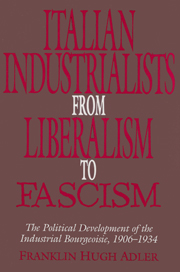 Italian Industrialists from Liberalism to Fascism
Italian Industrialists from Liberalism to Fascism Book contents
- Frontmatter
- Contents
- Preface
- List of abbreviations
- Italian Industrialists from Liberalism to Fascism
- Introduction
- 1 Associational development during the Giolitti era
- 2 The First World War: a precorporatist experience
- 3 The postwar crisis and the rise of Fascism
- 4 Liberal–Fascism
- 5 Industrialists and nonintegral corporatism
- Conclusion
- Index
2 - The First World War: a precorporatist experience
Published online by Cambridge University Press: 06 November 2009
- Frontmatter
- Contents
- Preface
- List of abbreviations
- Italian Industrialists from Liberalism to Fascism
- Introduction
- 1 Associational development during the Giolitti era
- 2 The First World War: a precorporatist experience
- 3 The postwar crisis and the rise of Fascism
- 4 Liberal–Fascism
- 5 Industrialists and nonintegral corporatism
- Conclusion
- Index
Summary
The transition to a “mobilized ”institutional framework necessitated a basic restructuring in the relationship between the CIDI and the state. The CIDI believed itself faced with the choice of either overtly entering the political process and exerting its influence over the state or, by default, running the risk that industry might become the supine object of unmediated governmental control. Although the CIDI was instrumental in the very conception of the Central Committee of Industrial Mobilization, the state agency charged with economic coordination, the CIDI saw its influence gradually undercut by the burgeoning state bureaucracy, which progressively absorbed its associational functions and co-opted its membership while dispersing its leadership. The CIDI and its affiliated organizations had been very much creatures of the liberal Giolittian era. Within the new mobilization context, they had seemingly lost their formative raison d'etre: the state repressed syndical conflict, the state tutored individual industrial interests, and the state mediated between diverse sectors. Rather than domination of the state apparatus by the CIDI, the war mobilization led to an unanticipated regression to a preassociative, clientelistic phase similar to that preceding the Giolittian period, where lines of interest ran vertically from individual firms to the state, unmediated by any autonomous intersectoral body acting in the generic name of industry.
- Type
- Chapter
- Information
- Italian Industrialists from Liberalism to FascismThe Political Development of the Industrial Bourgeoisie, 1906–34, pp. 89 - 159Publisher: Cambridge University PressPrint publication year: 1995


